What made the biggest splash on social media this year? Hurricanes, terrorist attacks, fake news, Russian bots? Nope - #MeToo.
Social media has played important role in conveying information. The power of social media is in its capability of sharing information. Refugees are able to stay in touch with their loved ones, social media was important enabler for Arab spring and the jury is still out to conclude how big a part social media played in the 2016 presidential elections in the US.
#MeToo, however, is bigger and different from all of those.
One side of #MeToo phenomenon is the viral spread of information. Far more interesting are the implications of this social movement started by Alyssa Milano.
Just how big was the #MeToo phenomenon - the facts and data
Let's first look at how the big #MeToo was in relation to other social media topics in 2017.
Media Coverage of on Facebook
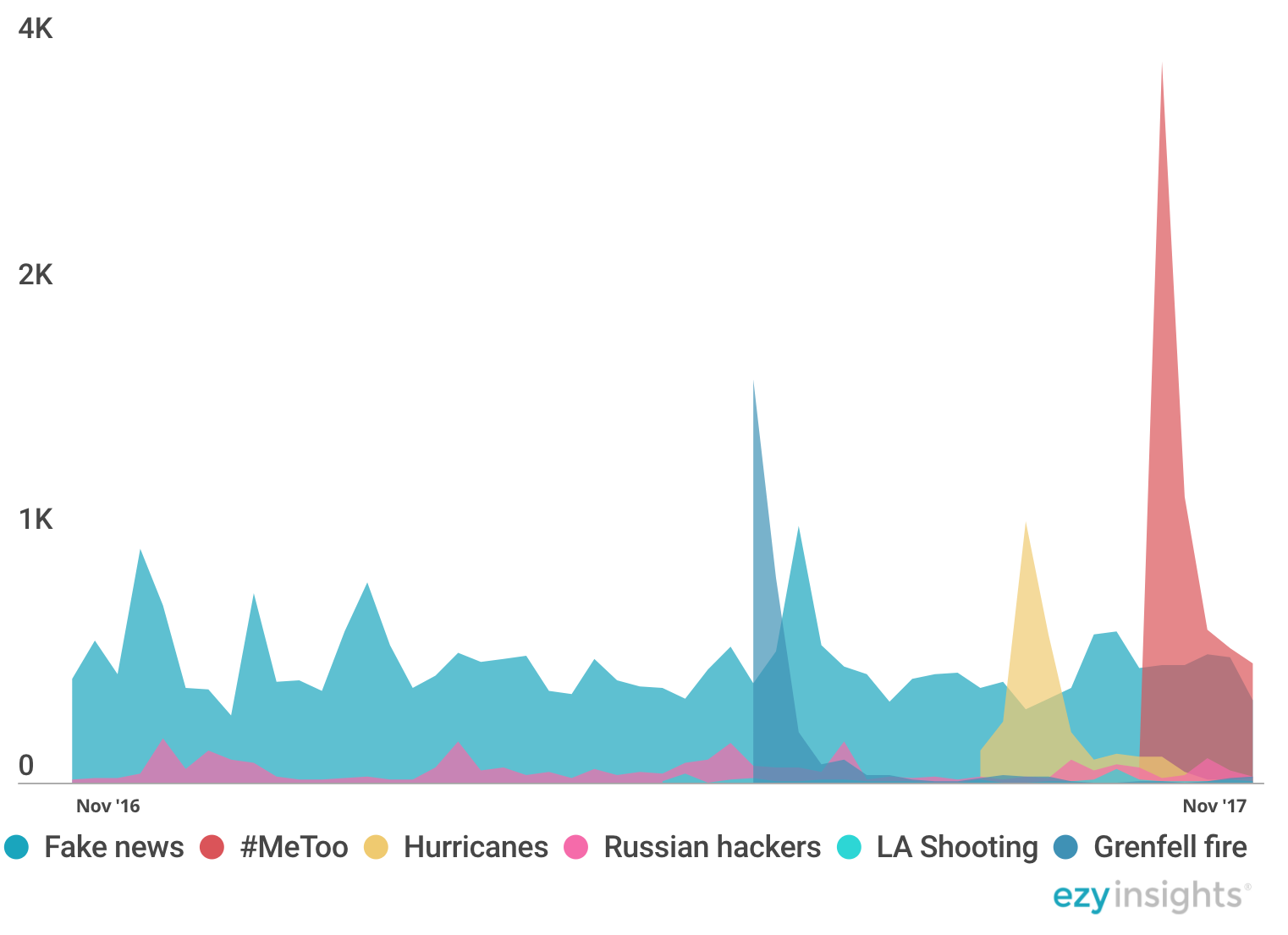 Effects beyond social media
Effects beyond social media
We have not witnessed a social media movement with such vast implications outside of the social media platforms they began on. Implications of #MeToo phenomenon over and beyond huge amount of social media posts and debate include:
The impact on high profile individuals (Harvey Weinstein and more, Kevin Spacey, Steve Juvertson just to name few high profile people). These are some of the most well know individuals in our society. One can only ask what is the impact on less visible people across the world. It is clear that people today are a lot more aware of sexual harassment at workplace and the it should be easier to come forward.
The impact on people close to the allegedly accused like Quentin Tarantino. Tarantino says he could have acted on the Weinstein's behaviour but didn't and feels some remorse (very publicly). How many others think the same? How many others could have intervened but didn't? More importantly, how many more people are today more willing and able than three months ago to protect the weak due to the #MeToo publicity? We all hope that is a big number.
The impact on companies and businesses. Companies have suffered from the acts of individual people. Netflix cancelled production of hit series House of Cards. Tesla and SpaceX had to make changes on their Board of Directors. These are again some of the most well known companies in the world. What is the impact on smaller and less well known companies? Maybe some changes now as well as more scrutiny over time with nominations?
The impact on victims should also be huge. More often than not the sexual harassment victims go through a cycle of self accusations and shame. #MeToo phenomenon has made the scope and scale of sexual harassment very public. Victims might be today able to relate better with other victims. Unfortunately there are lots and lots of women who have experienced sexual harassment. Hopefully victims are able to come forward and make sure the alleged attack is properly investigated.
The impact on general awareness regarding bullying, harassment and feminism. This is visible in the most popular search terms on Google search globally. More about these statistics further down in this post.
The impact on governments and legislation. Some countries, Sweden for example, has started a political debated over abuse, sexual harassment and equality over #MeToo. This might lead into changes in legislation. Obviously, there countries where the problem of sexual harassment does not exist. Allegedly.
The impact on values and ethics across the society and businesses is still an untouched topic. Sexual harassment is enabled by a culture of silence, avoiding conflict and hypocrisy. We like to think we always do the right thing. We like to thing everything is ok and nothing (too bad) happens. We like to think we live to our values and ethics. Clearly, we don't. There is still a need for further debate and discussion. This piece by the New York Times is just one making a very good point.
We have not seen anything similar in the short history of social media. Is it too bold a statement to say #MeToo is the social media event of 2017?
In comparison with other big topics
Fake news and Russian meddling in the US presidential elections have been in the news throughout the year, but #MeToo got the most attention in the shortest time span. Global media posted about #MeToo nearly 4K times per day on Mid-October - more than 2-4 times more than Grenfell Tower fire or hurricanes. On average, #MeToo was mentioned 1.1K times per week compared to 570 times for fake news and 250 for Grenfell Tower fire. And 71 lives were lost in the fire.
Global Scale
The #MeToo Twitter hashtag has trended in at least 85 countries, including India, Pakistan, and the United Kingdom. Some countries had their own translations:
France: #BalanceTonPorc
Italian: #QuellaVoltaChe
Spanish: #YoTambién
Canada: #MoiAussi
Hebrew: גםאנחנו#
Arabic: أنا_كمان#
China: #我也是
South Korea: #나도
Vietnam: #TôiCũngVậy
Here's how #MeToo and its translations spread on Facebook across the world.
![]()
#BalanceTonPorc was trending in French and Belgian media before #MeToo. #MeToo coverage started in the US on 15th October from Facebook posts by Fox 13 News, the women's magazine Wrap and SNEWS. Stories about #MeToo quickly caught fire in countries that already had their #BalanceTonPorc hashtag. Within a few hours stories went out on CNN Philippines and a few Indian viral news Facebook pages. Simultaneously, the news spread Netherlands, Bosnia and Herzegovina, Australia, Sweden, New Zealand, Iceland, and South Africa.
How did we get here?
Here's a timeline of key event contributing to the spread of #MeToo:
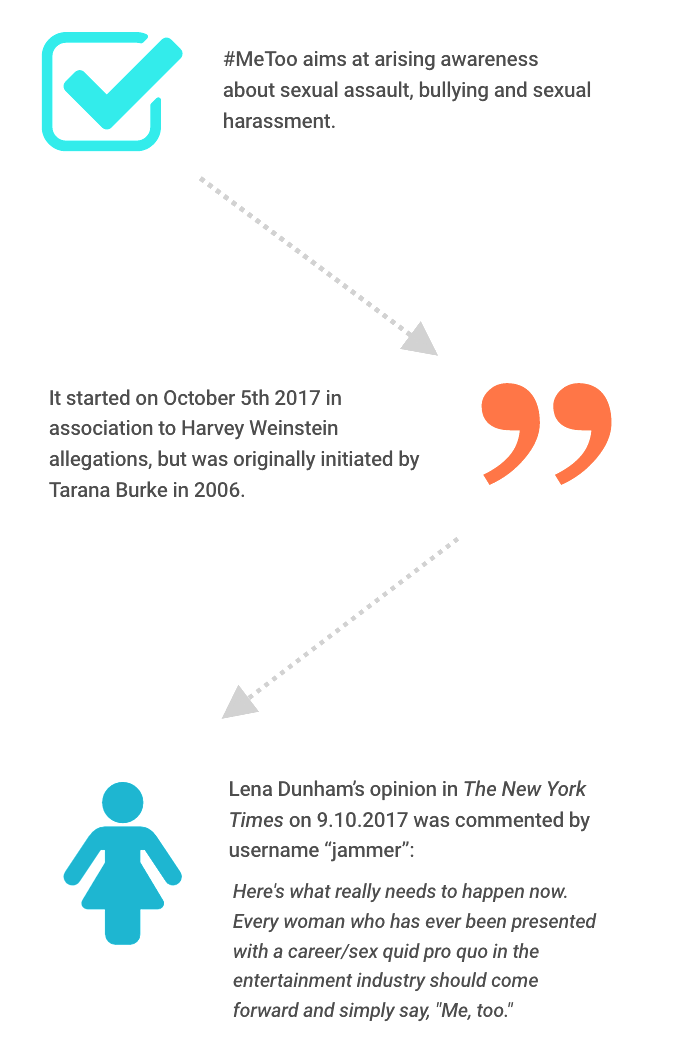
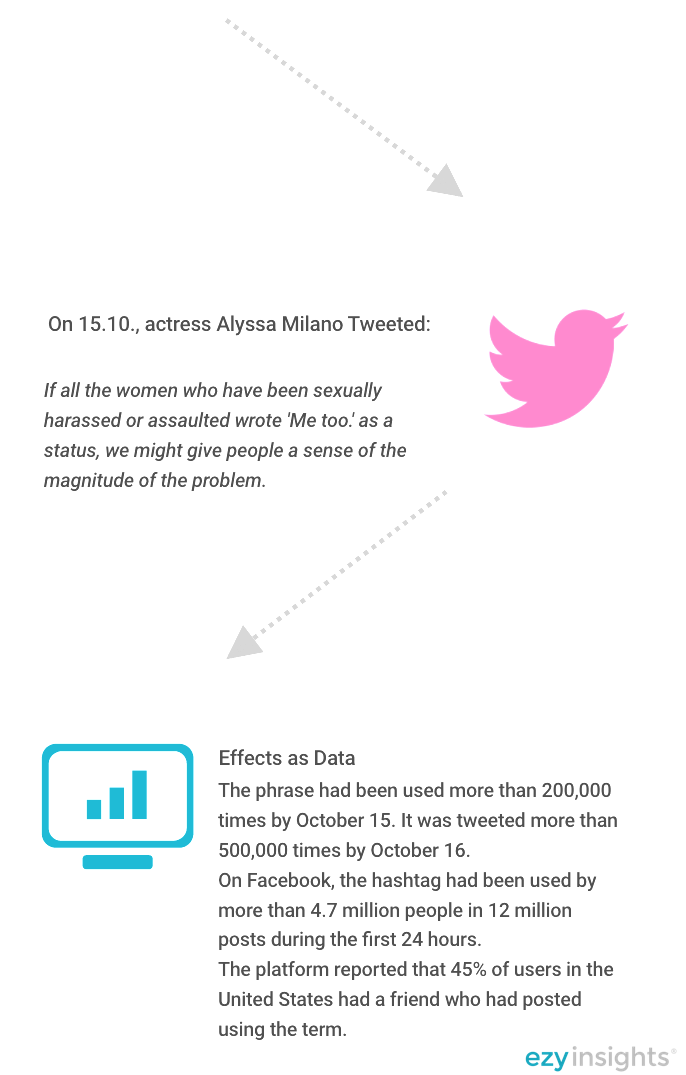
"Thank you"
We analysed the most engaging content during the campaign. The most popular Facebook posts by pages like Mic, BuzzFeed News, HuffPost Women and Upworthy, got hundreds of thousands comments that mostly expressed gratitude for starting the movement.
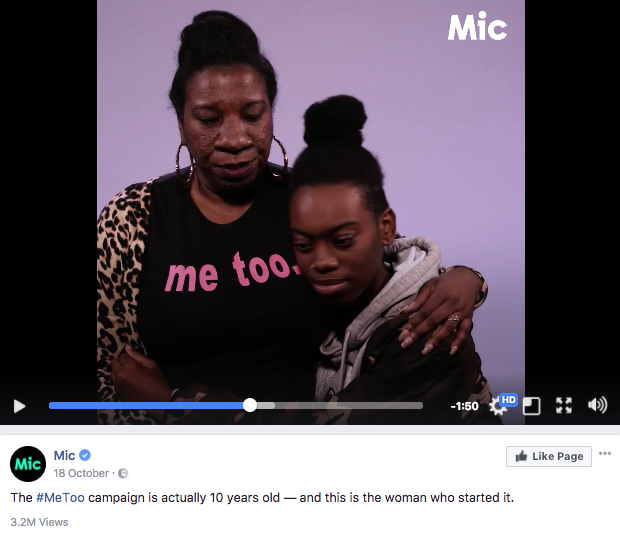
Tarana Burke's video interview by Mic was the all-time most engaging post, getting a lot of thankful comments. Below you can see the most frequently used words in comments on the top posts.
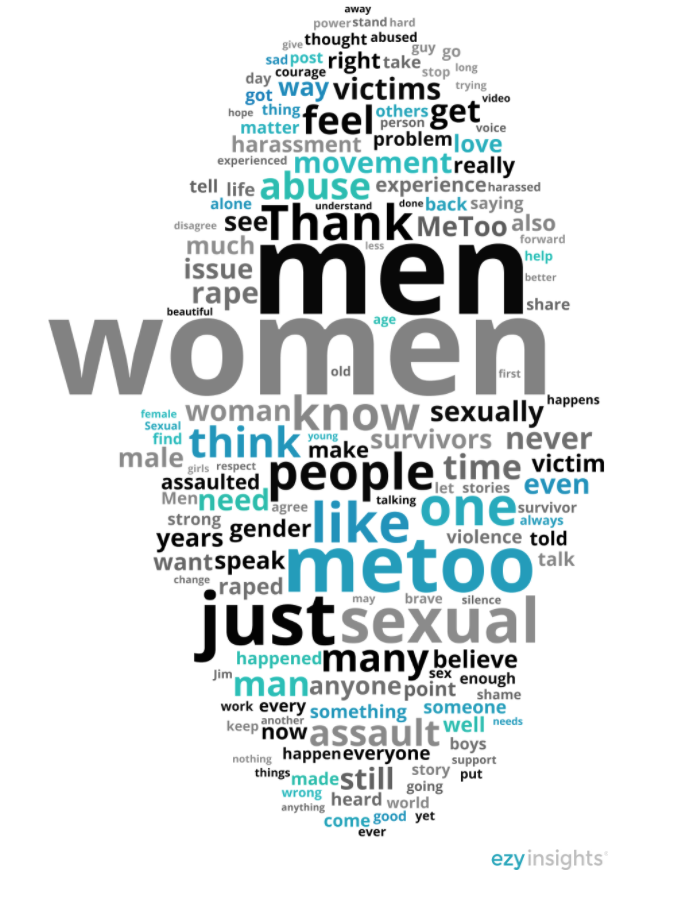
The attention towards #MeToo spread
Beyond discussion and engagement on social media, #MeToo caused a massive spike in Google search trends. At the same time, Google searches for terms related to sexual harassment started growing. Clearly, many people were interested in finding out more about the topic.
Google Search Trends (Source: Google Trends)
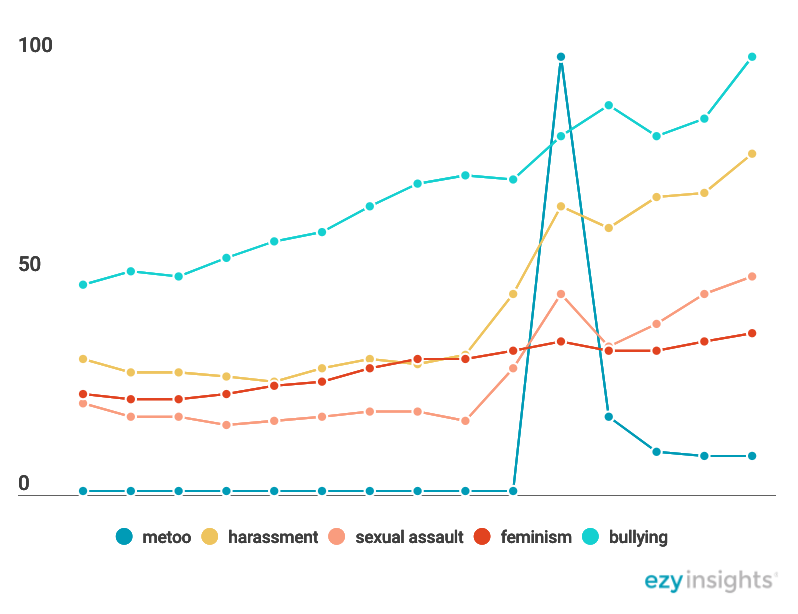
Social media following goes down for the accused
Over a hundred American celebrities and powerful individuals have been affected by the #MeToo movement. Take George Takei, for example. He denied accusations, but his social following on Facebook took a substantial hit from the events. His following started going down on Nov 11th 2017, right after he was accused on harassment by the male model Scott Brunton.
George Takei's Facebook page engagement (left) and Facebook Fan Count (right)
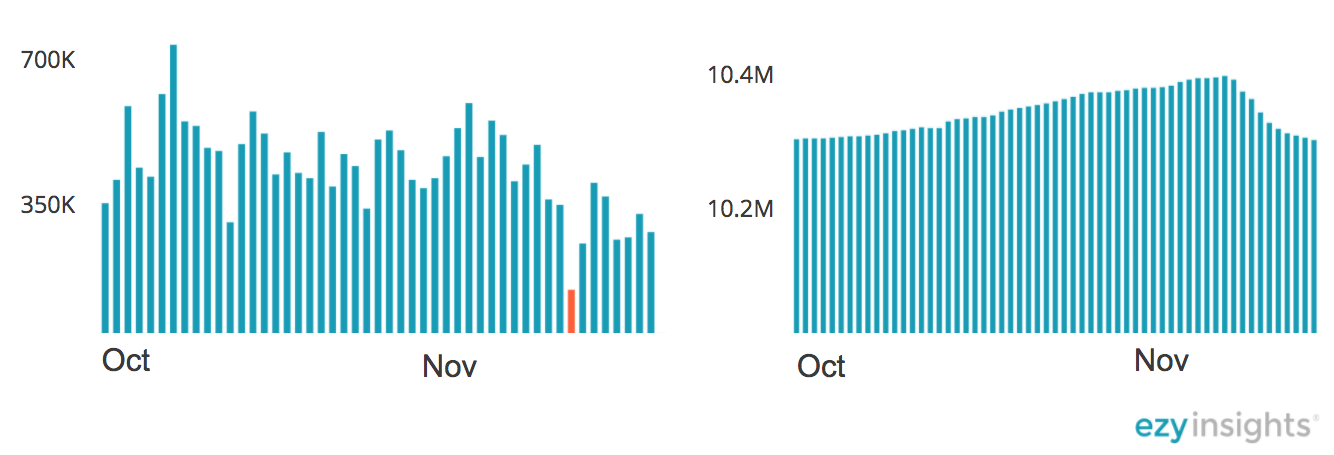
Future Impact
So, how important was #MeToo?
This is just the tip of the iceberg. Each allegation must be properly investigated. Every victim has not come forward. So far, #MeToo has done a lot to improve our society but there is still a lot of work ahead of us.
The impact on victims is perhaps the most important outcome: being harassed became something you can talk about.
Towards the end of November 2017, the individuals who were impacted includes at least 150 high-profile individuals from the US - and that is only the United States.
The hashtag and its translations spread throughout the world - Indian media for example - and the discussion continues. On late November, Indian women announced harassment case inside a religious community, something that has not been traditionally easy to do.
#MeToo may have long-term effect on companies (market capital, revenue, brand value, board of directors, ethics code, hiring, impact on management and hr functions, etc). The campaign may even have its impact on governments and legislation.
In the light of our data, the top 3 events in 2017 where social changed the world were Russian election hack, fake news and #MeToo.
The future impact will remain to be seen, but there are several reasons to claim that #MeToo was THE social media event of the year, not only in terms of social media coverage, but also in the sense that it was created through social.
